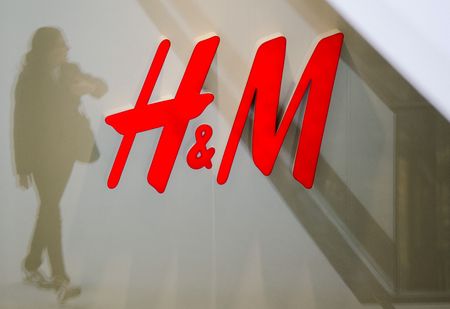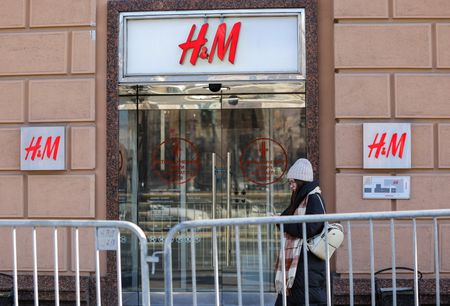

By Anna Ringstrom
STOCKHOLM (Reuters) -Sweden’s H&M on Thursday reported quarterly profits that were sharply below analysts’ expectations for the December to February period, as the impact of COVID-19, supply chain problems and investments weighed.
In its fiscal first quarter the group swung to a pretax profit of 282 million crowns ($30.5 million) from a loss of 1.39 billion a year earlier, well short of the 1.04 billion crown profit analysts polled by Refinitiv had on average forecast for the period.
The result remained far below pre-pandemic levels, with the group making a 2.50 billion crown profit in its first quarter of 2020. H&M shares were down 8% in early trade.
“Sales and profits for the quarter were impacted by the negative effects of the pandemic in many of the group’s major markets,” H&M said in a statement, citing supply chain disruptions and delays, and a new wave of COVID-19 in some markets.
“The result was also affected by increased growth-related initiatives, particularly within tech and the supply chain.”
In the first quarter sales rose 23% year-on-year, H&M reported earlier, still down 11% from two years earlier.
The world’s second-biggest fashion retailer after Zara owner Inditex said sales in the March 1-28 period, the start of its fiscal second quarter, were up just 6% in local currencies.
Excluding Russia, Belarus and Ukraine, where H&M has temporarily closed stores due to Russia’s invasion of Ukraine, the March increase was 11%, slower than in the first quarter. Last year Russia accounted for 4% of group sales.
“There is a continued uncertainty concerning developments and the company is monitoring and evaluating the situation continuously,” H&M said on the Ukraine crisis.
In the December to February quarter, well-received collections led to a higher share of full-price sales and lower costs for markdowns than a year earlier, it said.
($1 = 9.2620 Swedish crowns)
(Reporting by Anna Ringstrom; Editing by Niklas Pollard and Jan Harvey)

